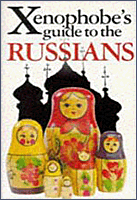






Contents:
 |
|||||
- Attitudes and Values
The Russian people's attitude to life is largely governed by the climate and the size of the country. Those who are born in the vastness of the steppe, as soon as they are old enough, try to get a permit to live in a cramped, two-roomed flat in a blighted suburb of one of the major cities. One of the main reasons for this is their weather. The Russian winter is known to military historians as "General Winter" because of the decisive part played by temperatures of 30╟ below freezing in many an attempted invasion of Russia from Western Europe. The climate can be summed up briefly as: spring - wet: roads impassable from mud; summer - unbearably hot: roads reduced to dust tracks; autumn - wet: roads impassable from mud; winter - perishingly cold: roads impassable from snow.
Travelling across Russia's vast distances has induced a kind of fatalism about ever arriving. Russians always travel with something to eat and drink and something to sleep on - even if it's only in the Moscow metro. Their fatalism can also take the form of a retreat into abstractions and grand theories, like bewailing the lot of old people in general while ignoring the plight of a particular old person in their own family.
Russians suffer from a feeling of a lack of control over their own lives. Everything is arbitrary, from whether there will be any meat or fish in the shops to whether buying and selling things at all is considered a capital crime. Daily difficulties and uncertainties have bred a certain endurance and fatalism into the Russian character.
The Russians value posidelki: the business of being in touch with people, such as sitting together in the kitchen drinking tea and talking about fundamental things well into the night. They also value sobornost, togetherness - the feeling you get in a church on one of the big feast days, when you are squashed up against 500 other people.
- Wealth and Success
Russian wealth has always been excessive. In the bad old Communist Party days, Brezhnev and his party chums used to enjoy limitless free airmiles courtesy of the Russian airforce. Children of the Party hierarchy would summon up a Tupolev to go partying in the Caucasus and, in one well-documented case, a plane was sent to Japan for a tea service.
Wealthy Russians buy private education for their children, dachas (small wooden weekend houses) or cottedzhi with every modern convenience, expensive fur coats for their wives and mistresses, a suit for every day of the week, mobile telephones and so on. The "New Russians", newly-rich businessmen and bankers aged 25-35 years, waft along in a cloud of the finest eau-de-cologne, ostentatiously and expensively dressed in a signature burgundy-coloured jacket of cashmere or leather, dripping with gold (watches, chains, bracelets).
Russian jewellery traditionally has an unrestrained quality - enormous, often rough-hewn precious stones, diamonds, emeralds and rubies the size of pigeons' eggs can be seen displayed decorating ceremonial robes and ikons in every Russian museum. This display of wealth is not particularly intended to impress. Snobbery is not a major part of the Russian character. Envy, and a bringing down of everyone to the same level, is considered more acceptable than allowing high-flyers their heads. Russians believe in the limitless bounty of Mother Nature in general and Mother Russia in particular. "Life is sweet, life is short. Tomorrow we may be stuck in the snow, so let's make the most of all our opportunities today."
- Religion
Religion is important to most Russians. Every self-respecting Russian grandmother makes sure her grandchildren are properly christened. The Russian Orthodox church has never been wildly interested in social reform or "good works" but giving to the poor was always considered praiseworthy until charitable activities of all kinds were made illegal during the Soviet period. Giving to good causes comes easily to most Russians - there is often a line of alms collectors (not by any means collecting only for themselves) outside a church or monastery and they are not chased away.
The Russian Orthodox church, with its dark, incensefilled interiors covered with ikons lit by the flickering light of candles and resounding to the chant of an unaccompanied choir, is the image of heaven on earth. It is not a place to sit and hear sermons about the evils of VAT on domestic heating.
To the Russians an ikon is not merely decorative, but a holy object in itself. Some of Russia's most venerated ikons are still believed to this day to be capable of performing miracles. In October 1993, the Patriarch of All the Russias, Aleksi II, had one of the most powerful images paraded round Red Square to seal President Yeltsin's victory over the rump parliament.
2009 ╘ All rights reserved. Designed by TatkaCo: tania@email.it
